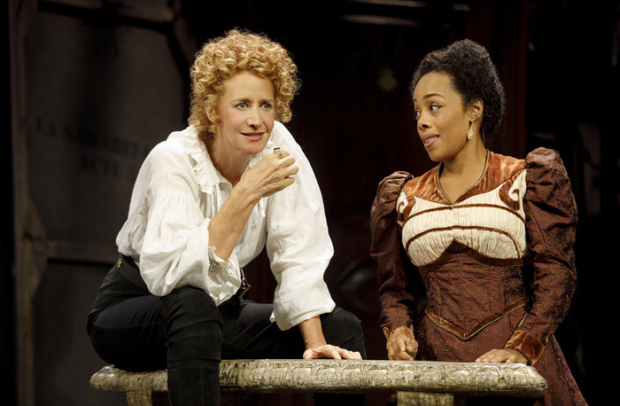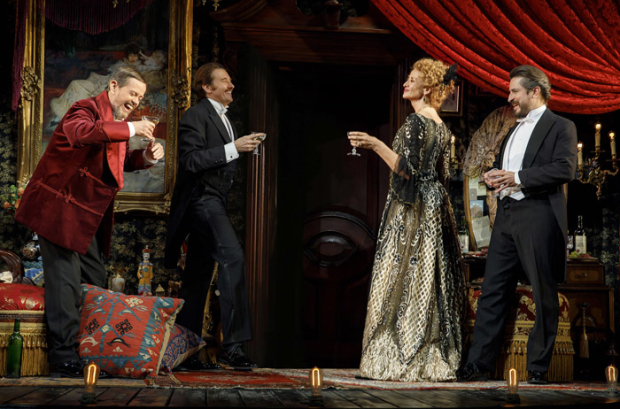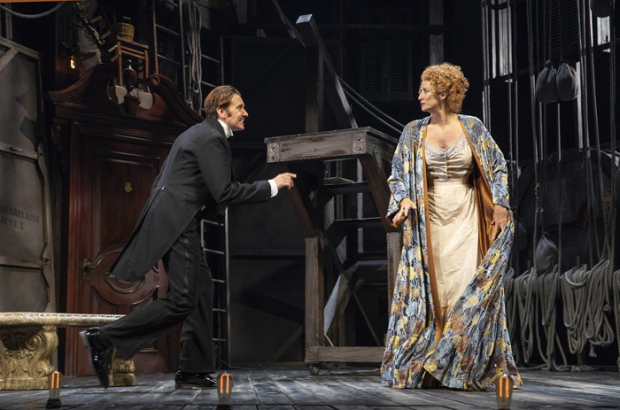In Bernhardt/Hamlet, Actions Speak Louder Than Poetry

(© Joan Marcus)
Sarah Bernhardt is done dying for her audiences — that is, unless she's allowed to start drawing blood herself. Fortunately, she only needs her own permission to wield Hamlet's mighty sword, and she's willing to both grant and accept that consent, regardless of what the men around her have to say. After all, she's the biggest star of the 19th (soon to be 20th) century, but that won't much matter if she's cast in history as a silent statue, or worse, the perpetually wilting flower of Alexandre Dumas's Camille. That would be a fate more tragic than Hamlet's death for both Bernhardt and her newest scribe, Theresa Rebeck, whose work of historical fiction, Bernhardt/Hamlet — making its world premiere on Broadway at Roundabout Theatre Company's American Airlines Theatre — does more than tell a story of yet another powerful woman held back by the patriarchy. There are elements of that as well (a theme that Rebeck explores in much of her work), but that's just the starting block for Bernhardt/Hamlet — a piece that's as audacious as it is delicate.
Amplify both "audacious" and "delicate" to their most luscious extents and you have Janet McTeer's performance as Sarah Bernhardt — not to mention her magnetic moments as the Danish Prince, even if her character does find him painfully long-winded (costume designer Toni-Leslie James gives McTeer a gorgeous but restricting second-act gown to contrast with Hamlet's freeing pair of pants). With a wingspan that fills the stage and a resounding voice that commands consideration, there is not a moment that McTeer is merely pretending to be the Divine Sarah. Even Bernhardt's layers of pretense (and as a lifelong actress portrayed in her 50s, there are many) are sewn permanently into McTeer's skin. She performs as a woman who doesn't know how not to perform, and needs a standing ovation just as much as, if not more than, she needs to pay her bills — and those are piling up.
Bernhardt hopes her gender-bending turn in Hamlet will get her both the adulation and bank account boost she requires, while her married-with-two-children lover Edmond Rostand (Jason Butler Harner, offering McTeer a point-for-point sparring partner) works on his next play, presumably for her. Their last collaboration, on Rostand's La Samaritaine, was coolly received by audiences, but Bernhardt is as confident in Rostand's brilliance as Rostand is in Bernhardt's magnificence. As a man of talent but self-doubt, Rostand needs to be seen this way by a divine creature. As a woman of strength in a man's world, Bernhardt needs to be seen as something more than the garlanded women Alphonse Mucha (Matthew Saldivar) paints on his production posters (Saldivar's bewildered musings on the feminine species are very entertaining).

(© Joan Marcus)
Their mutual admiration allows Rostand to shrug off his Hamlet skepticism, defending Bernhardt to his critic friend Louis (Tony Carlin, elbowing the press in the audience with his hot air), who describes the endeavor as "grotesque." Reciprocating the confidence, she commissions a playwright's nightmare, asking Rostand to rewrite Hamlet "without the poetry." Yes, she may be asking him to go up against Shakespeare and lose, but performing Hamlet as a man of endless words instead of action would be defeating her entire purpose of performing the role. Bernhardt is willing to take issue with Shakespeare, arguably the most unassailable straight white man in history. Rostand, though in a far more culturally appropriate position to do so, doesn't dare claim such power. And yet, to flippantly say that Bernhardt must just "wear the pants" in this relationship wouldn't be giving Rebeck nearly enough credit. Female power comes in all shapes and sizes, as we see in Ito Aghayere's brief but potent cameo as Rostand's wife, Rosamond.
It takes a good amount of meandering through Act 1 to see where exactly this plane is headed, but director Moritz von Stuelpnagel guides it along playfully — particularly in its moments of backstage farce. Dylan Baker is a comic highlight as the harmlessly pompous and stilted veteran actor Constant Coquelin (Beowulf Boritt's revolving set allows for smooth transitions between the bare rehearsal stage and Bernhardt's luxurious tchotchke-filled dressing room). Act 2, however, is where the story finally gathers its momentum and the meticulously placed pieces from Act 1 realign in ways that offer insight into questions both broadly about the timeless conflicts between men and women and narrowly about the passionate relationship between Rostand and Bernhardt. Is their connection one of love or mutual benefit? In the world in which they find themselves, is an equal partnership even possible? And as Mucha so obliviously yet insightfully inquired: "Is she Hamlet? Or is she a flower?"

(© Joan Marcus)










